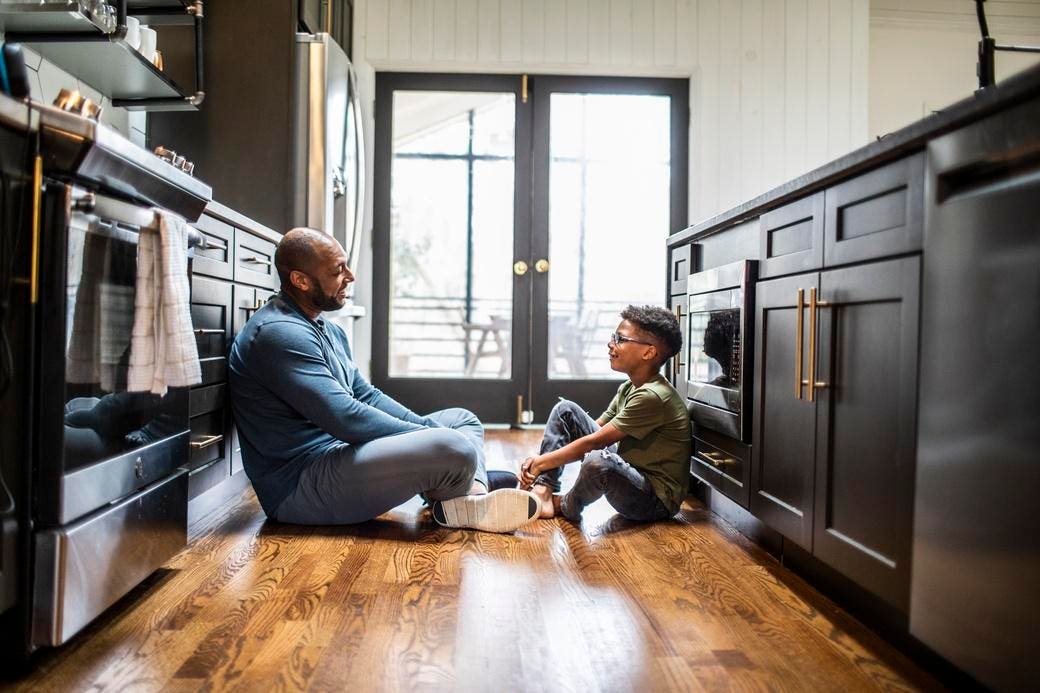Get there first.
That’s the best parenting advice I ever got, and it applies to every one of the most important values we choose to pass on to our children, as well as all the thorniest issues we choose to address—sex, alcohol, drugs, rock ‘n’ roll, and yes, money.
For all of us parents, there are things that we hope to impart to our kids, right? There are values we hope to instill in them, lessons that we hope they learn, experiences that we want them to have, and other experiences that we hope they’ll avoid. But when and how do we impart this wisdom so it lands and has the best chance of sticking?
When?
Sooner than you think. This is the advice I got many years ago when a medical doctor turned therapist came to speak to a group of new-ish parents of young children I was a part of. The first issue she raised was one that most of us would prefer our kids learn by osmosis: “the talk.” Sex.
She encouraged us not to fear the issue but to approach it as it is—one of the most natural parts of who we are as humans. She implored us not to use silly words to describe our most private parts and to engage our kids as early and often as they express curiosity about their bodies and [wince] their sexuality.
Of course, most of the men in the room were still acting like children themselves, squirming in their seats. (I may have been among them.) But I managed to contain my discomfort—that is, until I almost spit my drink out when she answered the question, “So, WHEN should we have THE TALK?”
“Early. Really early, like six or seven,” the good doctor said.
“What!?” I retorted, unable to contain myself. “That’s crazy!”
Harkening back to the sheer awkwardness of that particular exchange with my father (despite his earnest best intentions), I simply couldn’t imagine inciting that conversation with my own kids until as late as humanly possible. That is, until our guide explained her rationale from a scientific and psychological perspective.
She said that when kids are younger, they are super curious and aren’t yet old enough to be embarrassed when addressing the topic. Ok, good point. I was up for anything that would make this conversation less awkward.
But most importantly, she said, “You want to have this conversation BEFORE the rest of the world establishes the baseline understanding your children will have. You want to get there first. Before your pre-teen comes home from a friend’s house with an older sibling who has preemptively laid the foundation for your child’s understanding regarding one of the most important issues to be considered.”
OK, now I was all in. That made way too much sense. “So, when exactly do you propose having this conversation—and how?”
How?
Not how you’d expect. She recommended NOT having a planned sit-down discussion. (Seriously, how many of those worked for us growing up?) Instead, she challenged all of us to simply have the ears to hear, suggesting that the kids would open the door themselves with their innate curiosity, and all we needed to do was walk through it.
She suggested not scaring them with alarming warnings and, instead, leading with the fact that, within the right context, sex is one of the great joys of being human. She instructed us to use correct anatomical terms—not one-liners from our favorite comedies (dangit)—and then remember that the best “talk” is a series of conversations throughout their lifetime. This was just laying the foundation, and we should be ready to satisfy their budding curiosity again and again, as they grow and change and face progressively more difficult circumstances and decisions.
Financial Applications
The best thing about this great parenting advice is that it is universal. It works whether we’re talking about “the talk” or alcohol or drugs or faith or mean kids or sports or school or college—and especially money.
And when we have the eyes to see, our first money conversation comes so young—likely when our kids wonder what that small rectangular card is that we hand to people whenever we go into a store and come out with a bunch of stuff.
Their curiosity will lead you right into conversations about spending, sharing, saving, and investing—and when the time is right, you can really maximize their learning with their own rectangular card and a spend/save/share app, like Greenlight, which I have used for many.
Of course, one of the biggest and most important questions to consider and answer early is also one of the most expensive:
“Mom and Dad, what will you pay for college?”
Again, in lieu of allowing someone else’s parents to lay out their plan—or lack thereof—as your child’s baseline expectation for college planning, let it be your plan. And yes, that means you need to have one.
4 College Planning Questions
If you need a kickstart, I’ve got plenty for you to consider in “The Non-Conformist’s 4-Step Education Savings Plan,” but here are the four questions you’ll likely need to answer before you can answer Junior’s college questions:
1) Can you? Can you afford to pay for your child or children’s college education? Please be honest with yourself, because if you destroy yourself financially to pay for your kids’ schooling, you’re not actually doing them any favors if they have to bail you out later in life.
2) Will you? Yup, this is still a question. Even if you can afford to send seven kids to Harvard, it’s still your choice—and this is where your answer to this question becomes an opportunity to shape your children. Many parents of means still choose to ensure their kids have some “skin in the game” in order to maximize this major life experience.
3) What’s your Family Education Policy? This is your answer to the question, “What are you going to pay?” Since they were in middle school, my two boys—both currently in college—have known that I was willing to cover up to the financial cost of an in-state state university. They could go anywhere, but they’d have to get scholarships or take on some of the financial burden themselves if it cost more than the great State U at their disposal.
4) What’s your education savings plan? What amount, and where, should you save in order to fund your Family Education Policy? Sure, a 529 is likely a part of that, but probably not the only part.
So, are you ready to have some difficult—but productive and potentially life-changing—conversations with your kids? If so, don’t wait. Get there first.
Read the full article here










